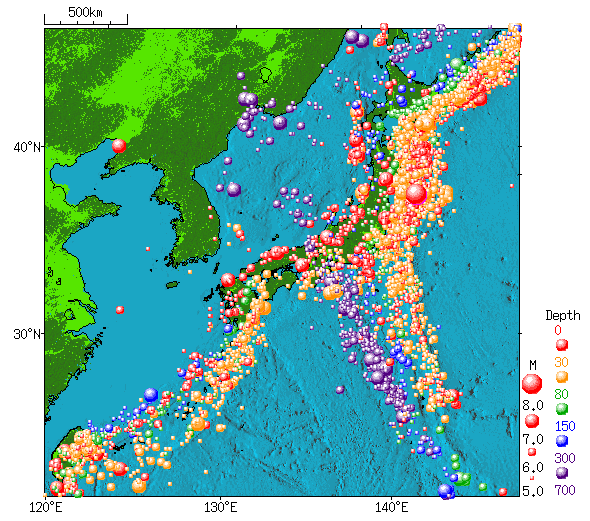What has been going on in Japan?
Consecutive powerful earthquakes reaching up to magnitudes of 7.6 have been hitting western Japan, which have been damaging homes, buildings, and the overall lives of the citizens. In addition to strong earthquakes, Japan has been experiencing harsh aftershocks triggered by the earthquakes, which contribute to the damage. These current earthquakes in Japan are nearly the strongest the country has ever experienced, since 2011 when a 9.0 magnitude earthquake and tsunami hit the country.
Earthquakes are quite common in Japan and have been happening for centuries; but when will the country reach its breaking point? As Japan continues to endure more earthquakes and tsunamis, the country has been slowly deteriorating, and it is only time before Japan can’t take any more.
Race Against Time
On January 1, 2024, a 7.6 magnitude earthquake hit Ishikawa Prefecture, Japan, leaving the country in shambles. Earthquakes in Japan have already caused most of the citizens in the country to struggle so early into the new year. This recent earthquake has resulted in many people being trapped under debris, plus first responders needing to quickly find everyone.
These earthquakes have been putting stress on everyone in the country, and leave people wondering: when will the next one happen? As more and more debris piles up, people continue to get trapped and get put into life-threatening situations. First responders are constantly needed to help find citizens and lift them out of the rubble. However, it might be only a matter of minutes before the aftershock or next earthquake strikes. The mayor of Suzu, Japan, Masuhiro Izumiya states, “We really need to muster all of our remaining strength to continue rescue efforts” on January 3, 2024 at a Regional Disaster Response meeting.
What is Causing These Earthquakes?
Japan has had a long history of withstanding earthquakes, which dated back almost 1,000 years. The country is very prone to earthquakes, as it sits on tectonic plates that are constantly hitting each other. About 1,500 earthquakes hit Japan yearly and even 40-50 daily; even if they are too mild to be felt. Seismic activity is constantly happening in Japan and the Japan Meteorological Agency records the time, place, and magnitude of every earthquake that happens.
The main cause of many of the earthquakes and tsunamis in Japan is the Pacific Plate on the East Coast. This plate converges under the surrounding 2 plates, and when the movement gets large enough, an earthquake occurs.
How Does Japan Prepare For These Earthquakes?
Since the 9.0 magnitude earthquake that happened in 2011, Japan has enforced their earthquake warning systems. Smartphones in Japan are installed with an earthquake early-warning system which notifies everyone in the country. Schools also practice earthquake drills for students to be prepared for any upcoming earthquakes. Families might also keep food and water in stock in case a major earthquake causes a lockdown. Lastly, scientists are trying to figure out how to create buildings that can withstand earthquakes as well.
After the recent earthquake on January 1, 2024, a tsunami warning was issued which warned citizens to move to higher ground. Smartphones are also able to access a Disaster Message Board Service which allows citizens to send or forward notifications to friends and family to update them on their safety status. In addition, an information-providing app allows foreigners visiting the country to receive emergency updates on the weather conditions. Disaster guide books are also available on the Tokyo Metropolitan Government official website for anyone to look at.
Children in school are also informed on how to prepare in the event of an earthquake. Earthquake drills are held as often as once a month in Japanese schools and teach students how to stay safe during one. When an earthquake occurs during school, students are taught to go under their desk sitting upright and hold onto the legs of the desk until the earthquake has ended. After the earthquake is over, teachers guide the students outside and do a roll call to make sure everyone is safe. But if an earthquake happens while students are playing outside during school, students must gather in the middle of the field, away from the building.
Many buildings in Japan are built to withstand earthquakes and their foundations are sturdy and stable. However, older buildings do not have this strong foundation, and they are more prone to collapsing in the event of an earthquake. Newer buildings with stronger foundations rarely ever collapse or snap during earthquakes, but rather, they sway and are flexible. Scientists are working on getting the majority of the buildings in Japan to be built stronger and even finding ways to make already strong buildings even stronger.
Outside thoughts & opinions about the situation
After asking people questions about what they thought about the earthquakes in Japan, many didn’t know that the country was in trouble. This is not good because as another country in the world, we should be bringing awareness to Japan and trying to help them. After finding out many people were unfamiliar with the earthquakes, more questions were asked.
The first question asked was: Have you heard about the earthquakes in Japan? Most of people’s answers were either no, or that they have slightly heard about them. After asking the first question, the next question asked was: How do you think these earthquakes will further impact Japan?
Bianca Marotta, a sophomore at Roxbury High School said, “I don’t know much about the earthquakes, but if they are happening over and over again, especially bad ones, I think the country will continue to struggle and continue to get damaged.” This response is what others thought as well, and is most likely what is going to happen if other countries aren’t able to help Japan.
Similar responses were given such as “Oh, I didn’t know that was going on,” expressed by Layla Martinez, a sophomore at Roxbury High School, and “That sounds bad,” sophomore Yasmin Melgar stated. If people are unaware of the situation in Japan, the country might not get as much help as they need. The last question that was asked to students was: Do you think that we should do something to help Japan during this difficult time in their country? To which most people said yes.
Even though many people didn’t know about the earthquakes in Japan, they do think we as a country should try and help Japan. Bianca Marotta stated, “I think the government should try to help Japan and give them the things that they need.” Similarly, Yasmin Melgar agreed by saying “Yeah, I think the government should try to help and other countries should try to help too.”
Japan is going through a very difficult time at the moment, and the conditions are getting worse as more earthquakes strike the country. Although they know how to deal with conditions like this, it is still bad to constantly deal with earthquakes, tsunamis, and aftershocks while most of the country has deteriorated. It will take a while to recover from the current state of Japan, but slowly it will get better.







